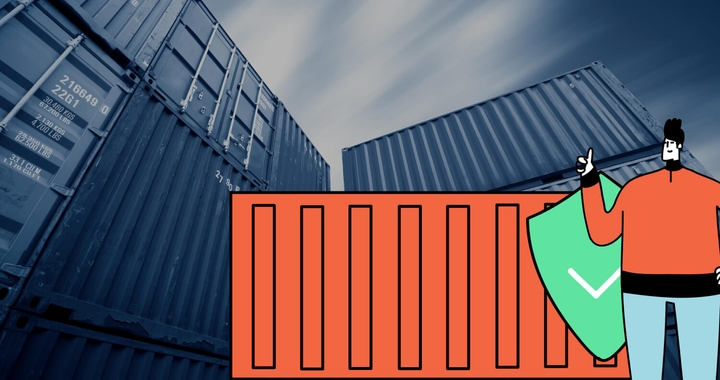The Difference Between Freight Insurance & Cargo Insurance


There’s a crucial difference between freight insurance and cargo insurance, which, if your business is engaged in international shipping, you need to be aware of.
In this article, we’ll simply and clearly explain what that difference is. Put simply, freight insurance protects the freight forwarder. Cargo insurance protects you, the customer.
We’ll also outline why it’s important to get both types of insurance for every international shipment you make. It might help you avoid an unfortunate situation in which your goods are lost or damaged, but you realize too late that you have not insured them properly and will not be compensated as much as you expected.
Things You Need to Know Before You Insure Your Goods
When you ship your goods as the ocean or air freight, it’s important to know that they are not automatically insured against loss or damage. To be properly covered, each shipment needs both freight insurance and cargo insurance.
If you’re a buyer or seller wishing to ship goods from one country to another, freight insurance will not cover the value of your goods.
That particular insurance product covers the freight forwarders, as we’ll explain shortly. However, you can and should get cargo insurance, as it covers the value of your shipment, in much the same way as a home-contents insurance policy covers the value of items in your home.
Unlike the contents of your home though, which stay put indefinitely, your cargo, and the responsibility for its risk protection, is only in your care during its time in transit according to the agreement made with your business partner.
Furthermore, the duration of that responsibility depends on whether you are the buyer or the seller, and on the sales agreement governing the terms of transportation. The rules for the sale of goods around the world, including shippers’ liabilities and responsibilities are governed by the International Commercial Terms of 2020, commonly called incoterms®
The Link Between Insurance and Incoterms
Unless you are completely new to international trade, you will already have come across the intricacies of incoterms. Nevertheless, the way in which they link with your liability and insurance is a crucial point to grasp.
If you would like to understand incoterms in detail, you might like to look at a more comprehensive guide recently published in our Knowledge Series. It explains Incoterms and the recent changes arising from the International Chamber of Commerce’s 2020 revision.
The most important point about Incoterms to note here is that they will determine which of the two business partners is responsible for the risk— and therefore for insurance—of the goods, and when the risk passes from one party to the other.
For now, let’s just look at three of the incoterms most commonly applied to international sales agreements, and how the responsibility for insurance fits into them:
-
EXW (Ex Works): Under this incoterm, the buyer bears the risk and insurance costs from the export customs clearance stage through to receipt of goods
-
FOB (Free On Board): Here the seller is responsible for risk and cost until the goods are loaded onto the cargo vessel or aircraft. At that point, the risk and cost transfer to the buyer.
-
CIF (Cost, Insurance, and Freight): In a sale transacted under the CIF incoterm, the seller accepts risk up to the point the goods are loaded onto the cargo vessel or aircraft. The seller also pays the cost of insurance until the goods reach the port of discharge. The buyer shares the cost at the port of discharge and has sole responsibility for cost and risk from then onwards.
It’s vital that any international sales agreement clearly states one of the Incoterms® to ensure that both buyer and seller know where responsibility for cargo insurance lies.
But what about freight insurance? Let’s look at that for a while, because although freight insurance and cargo insurance are often assumed to be the same thing, they differ in several ways. When the two are confused, the unwitting shipper can easily be tripped up, incorrectly believing that goods-in-transit are covered by freight insurance for their full value in the event of loss or damage.
What is Freight Insurance?

Also called freight service liability (FSL) insurance, freight insurance is one of several costs that will be included in your shipping quote. Crucially, freight insurance only covers the freight forwarder or logistics provider against claims arising from their mistakes and/or negligence.
It is cargo insurance that protects you, the customer, and the value of the goods you wish to ship. Hence, you should not rely on freight insurance to cover the value of your consignment.
Even if your forwarder’s action or inaction results in loss or damage to your goods-in-transit, compensation provided by freight insurance is likely to amount to a mere fraction of their worth.
What Does Freight Insurance Cover?
Freight insurance covers a freight forwarder’s liability for damage or loss to customers’ goods during transit. Any such damage or losses must be caused by the freight forwarder’s negligence for a claim to be payable.
All freight insurance cover is calculated on the basis of the weight of the goods. So, for example, in the event of a freight insurance claim, the same amount would be paid out for 1 kg of gold as it would for 1 kg of paper.
Even in the event of a successful freight insurance claim, your recompense, as previously mentioned, is greatly limited. The terms of freight forwarders’ liability are set out in conventions that differ depending on the chosen mode of transportation.
Those conventions, a brief description of which you can see below, place ceilings on the amount of compensation due to the shipper, which consequently, are mirrored in freight insurance terms:
Sea freight insurance
Convention: Hague-Visby Rules (also known as the Hague Rules or Rotterdam Rules)
Maximum liability: SDR* 666.67 per package, or SDR2 per kilo, whichever is more.
*SDR stands for Special Drawing Rights. This is a system operated by the International Monetary Fund and represents a claim to various currencies.
Air freight insurance
Convention: The Montreal and Warsaw Convention
Maximum liability: SDR 19 per kilo
International road freight insurance:
Convention: CMR (Convention on the Contract for the International Carriage of Goods by Road)
Maximum liability: SDR 8.33 per kilo
How is Freight Insurance Calculated?
Freight insurance is calculated as a percentage of the freight forwarder’s fees. These are payable by the freight forwarder and passed onto the customer as a cost that’s built into the forwarder’s service quote.
What is Cargo Insurance?

While often not obligatory, cargo insurance is essential if you want to protect the full value of the goods that you wish to ship. Depending on the incoterm applicable to the international sale/purchase transaction and the shipment’s destination, either the shipper or the buyer is responsible for bearing the risk of cargo loss or damage and hence, for the decision to procure cargo insurance.
Often, each party has responsibility for specific stages of the same shipment. Please see our article on Incoterms®, mentioned earlier, for more information.
The level of cargo insurance cover is based on the value of the goods being transported. Therefore, the full value of the cargo should be insured in order for that value to be reimbursed in the event of loss or damage.
What is Marine Cargo Insurance?
Cargo insurance for goods being shipped by sea is known as marine cargo transit (MCT) insurance. It protects you against the risks your cargo is exposed to during maritime shipping. It may also include cover during rail or road transportation to the port of loading and from the port of discharge.
The stage at which responsibility for the shipment lies with the seller or buyer depends on the incoterms agreed in advance. The terms of the insurance policy will typically provide cover for physical loss or damage of goods during ocean shipping.
For a claim to be valid, it doesn’t matter who is responsible for the loss or damage, or how it happened, as long as it is not the fault of the insurance beneficiary.
What is Air Cargo Insurance?
Air cargo insurance covers goods being shipped on aircraft. It typically works on the same principles as marine cargo transit insurance. An air cargo insurance policy may also cover the overland transportation of freight to the airport of loading or from the airport of discharge, where applicable.
How is Cargo Insurance Calculated?
The insurer will base the insurance premium they charge on a percentage of the value of the cargo, as well as the following criteria:
- The nature of the freight—is it hazardous for example?
- The size, weight, and dimensions of the freight
- Where the cargo is being shipped from and to
- Which route the carrier is taking from the port of origin to the port of arrival
How Does Cargo Insurance Work?
The precise terms of your cargo insurance will be detailed in the policy provided by your insurer. As with all insurance documents, you should take care to read the policy thoroughly. You can usually claim for lost or damaged cargo regardless of who or what has caused the loss or damage—as long as you aren’t responsible for the loss or damage yourself. The claim procedure will be laid out in the insurance documentation.
When is a Cargo Insurance Claim Triggered?
Under the terms of most cargo insurance policies, a claim is payable when the covered goods are lost or damaged and following an assessment by the insurer. It is the carrier’s responsibility to report the loss or damage to the customer. The precise nature of the perils covered will be detailed in the insurance policy document. Cargo insurance claims must be made within certain time frames for the claim to be valid. For example:
-
For damaged goods shipped by sea: claims for visible damage must be made upon receipt of the damaged goods. Claims for hidden damage must be made within three days of the goods being discharged.
-
For damaged goods shipped by air: claims should be made no later than 14 days after receiving the damaged goods.
-
For loss of goods the claim is triggered by the notification in case of complete loss or at the realisation of the physical loss at receipt in case of partial loss.
How is a Cargo Insurance Claim Processed?
Most cargo insurance claims usually take several weeks to process. Loss quantification must take place and loss-adjuster reports have to be compiled. The customer also needs to sign a discharge receipt letter before any compensation will be paid.
How Much Can You Claim on Cargo Insurance?
Cargo insurance will typically provide full compensation for the loss or damage to the goods, up to 110% of the value of the commercial invoice, as well as other expenses incurred, if any. Therefore, the exact amount payable will depend on the value of the cargo and the associated shipping costs as declared by the shipper and charged for by the insurer in the premium.
Who Can Insure My Shipment?
Cargo insurance can be:
- Paid by the buyer of the goods in advance to the seller of the goods as part of the goods purchase order
- Paid to the freight forwarder by whoever is taking responsibility for the cost of the shipment to cover the cargo value on that person’s behalf
- Paid directly to a cargo insurance broker or company by whoever is responsible for the risk to the shipment (as determined by the incoterms)
Arranging Cargo Insurance With Your Freight Forwarder
As your freight forwarder will be responsible for coordinating almost every aspect of your shipment, it may make sense to let them handle the cargo insurance too. If you decide to exercise this option, it does not mean that the forwarder will act as the insurer of your goods.
Instead, the forwarder will engage a cargo insurance company on your behalf, submitting a written request, paying the premium, and receiving an insurance policy that’s subject to terms and conditions.
The cost of this service will usually be incorporated into your quote. In the event of a claim, the freight forwarder will file it with the cargo insurance company on your behalf, and will handle any correspondence until a settlement is reached.
Arranging Cargo Insurance With a Broker or Insurance Company
You can choose to arrange cargo insurance yourself. This will almost certainly involve contacting various insurers and outlining the details of your shipment with each one before receiving and comparing quotes. In the event of loss of or damage to your goods, you will have to file your claim, sign a discharge receipt and waiver letter, and correspond with the insurer until a settlement is reached.
Do I Have to Insure my Shipment, and is Cargo Insurance Worthwhile?
When shipping goods by air or sea, you are putting them in the hands of freight forwarders and carriers. You are trusting these service providers to safely ship your goods from the point of origin to your specified destination.
In the vast majority of cases, freight is transported by air or sea without incident. But, as with all things in life, there are no guarantees. All shipping carries an element of risk.
The hazards that your cargo can potentially face include fire, theft (including piracy), damage, and jettison. For peace of mind, it’s advisable to insure your goods against such incidents, just as you would insure your car or items in your home. If you don’t do so, the cost of the loss or damage of the goods will be yours to bear.
Avoid Mistakes when Insuring Your Freight
In the final analysis, you’re free to bear the risks of shipping in any way your business pleases. However, if you prefer to take the safest approach, we suggest that you protect your goods for their full value by investing in cargo insurance.
We hope that the knowledge gained from this quick read should spare you from the common, but potentially costly, mistake of assuming that your forwarder’s freight service liability insurance, often just called “freight insurance”, will be sufficient to protect your assets while at sea or in the air.


